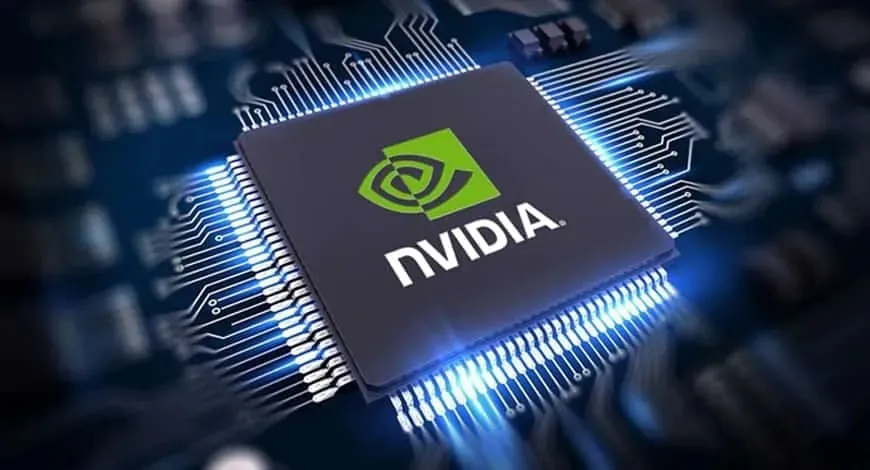Nvidia Designing New AI Chip for China Under U.S. Export Rules
Nvidia is developing the B30A AI chip for China, faster than the H20, following U.S. export rules and new market regulations.

Key Facts
- B30A: New Blackwell-based chip for China, single-die, stronger than H20.
- H20: Hopper-based export-compliant chip, briefly banned then reinstated in July.
- RTX6000D: Cheaper China-specific inference chip, bandwidth just under U.S. threshold.
- China share: 13% of Nvidia revenue last fiscal year.
- Competition: Huawei Ascend chips gaining ground, though weaker in software.
- Politics: U.S. lawmakers divided on scaled-down exports; Beijing raising security doubts.
Nvidia is developing a new artificial intelligence processor for the Chinese market that would be more powerful than the H20, the company’s current export-compliant chip, according to people familiar with the plans. The move underscores how the world’s most valuable semiconductor firm is navigating U.S. restrictions on advanced technology while trying to protect a key source of revenue.
A New Blackwell-Based Design
The processor, known internally as the B30A, is built on Nvidia’s Blackwell architecture. Unlike the flagship B300 accelerator that uses a dual-die layout, the B30A will feature a single-die design, which is simpler to manufacture but caps peak performance. Even so, industry sources said the chip will offer significantly more computing power than the H20, which is based on the older Hopper platform.
The new design is expected to include high-bandwidth memory (HBM) and NVLink connections to speed data transfers between processors—both crucial features for training large-scale AI models. Nvidia aims to ship early samples to Chinese partners as soon as next month, though specifications may still change.
A company spokesperson declined to comment on the new chip but said: “We evaluate a variety of products so we can be ready to compete within the rules. Everything we offer is approved by the relevant authorities and intended solely for commercial use.”
Washington Sets Performance Limits for Nvidia Chips in China
The B30A exists because of strict U.S. export limits. Since late 2022, Washington has restricted the sale of advanced GPUs to China over concerns that Beijing could use them to develop military AI systems. In April 2024, the Department of Commerce tightened the rules further, setting thresholds on processing power and memory bandwidth.
Nvidia has repeatedly had to rework its China lineup to fit those limits. The H20, designed specifically to comply with 2023 rules, was briefly banned this April before regulators allowed sales to resume in July.
Last week, former president Donald Trump, who is campaigning for a return to the White House, said Nvidia might be allowed to sell scaled-down Blackwell chips in China. He suggested a 30–50% cut in computing power compared with U.S. models and dismissed the H20 as “obsolete.”
Approval, however, is far from certain. Lawmakers from both parties have argued that even trimmed-down versions of Nvidia’s most advanced chips could boost China’s AI capabilities in sensitive areas.
China Market Important for Nvidia
Despite the restrictions, China remains vital for Nvidia. The country accounted for 13% of the company’s revenue in the last fiscal year, according to filings. Chinese cloud providers, startups, and research institutions are among the biggest buyers of GPUs for AI training.
“If Nvidia can’t sell competitive products into China, there’s a risk its customers will permanently switch to domestic alternatives,” said Dan Wang, a tech analyst based in Shanghai. “That’s a bigger threat than losing one product cycle.”
The pressure is compounded by the rise of Huawei Technologies, which has made rapid progress in AI chip development. Huawei’s latest Ascend processors are said to rival Nvidia in computing power, though analysts note they still lag in software support and memory efficiency.
For now, Nvidia’s CUDA software ecosystem remains a powerful moat. Developers who build AI systems around CUDA face high switching costs if they move to alternatives. That has kept many Chinese firms tied to Nvidia even as Huawei gains momentum.
U.S.-China Dispute Over Nvidia Chips
Tensions between the United States and China are affecting Nvidia’s chip sales. U.S. officials consider advanced AI processors strategic technology, while Beijing has criticized Washington for restricting access, saying it limits China’s technological development.
Chinese state media recently questioned the security of Nvidia’s products, suggesting potential risks for local users. Industry sources said regulators have quietly advised domestic companies to be cautious about purchasing the H20. Nvidia denied these claims, stating its chips do not contain backdoors or hidden vulnerabilities
The dispute has become one of the sharpest flashpoints in U.S.-China trade relations, alongside tariffs, rare earths, and access to cloud computing.
Nvidia Plans Cheaper AI Chip for China
Nvidia is preparing a second processor for the Chinese market. The RTX6000D, expected to ship in September, is designed for AI inference, where trained models generate outputs rather than learn from new data.
The RTX6000D is less powerful than the H20 and will be offered at a lower price. It uses GDDR memory instead of high-bandwidth memory (HBM) and has a bandwidth of 1,398 gigabytes per second, just under the 1.4-terabyte limit set by U.S. export rules. First reported in May, the chip is built to comply with U.S. regulations while providing a more affordable option for Chinese customers.
Nvidia Faces Approval and Market Risks in China
Nvidia’s two upcoming chips for China—the high-performance B30A and the lower-cost RTX6000D—come at a time of regulatory uncertainty. The B30A must receive U.S. export clearance before it can be sold, and any delay or denial could leave Nvidia with limited options in a market where domestic alternatives are advancing rapidly.
In addition to regulatory hurdles, Nvidia’s challenge includes maintaining business with Chinese firms that depend on its hardware and software ecosystem for AI development. Losing these customers could give Chinese competitors, including Huawei, a chance to expand their presence and capture part of Nvidia’s market share.
Also Read: Nvidia Faces Chinese Scrutiny Over H20 Chip 'Backdoor Access' Issue
































































